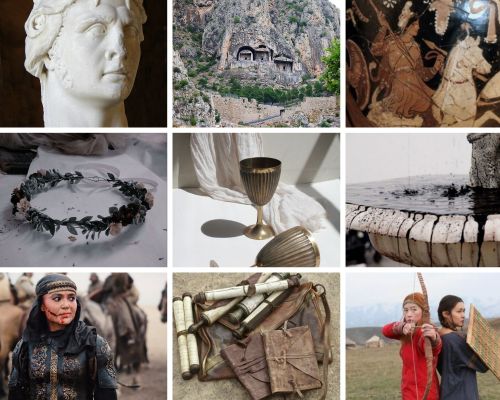💫
💫









name moodboard: Maria
↦ Latin form of Mary, which is derived from the Hebrew Miryām, a name of debated meaning. Many believe it to mean “sea of bitterness” or “sea of sorrow.” However, some sources cite the alternative definitions of “rebellion,” “wished-for child,” and “mistress or lady of the sea.”
More Posts from Marianikolaides and Others





the economics students
busy streets, the smell of car exhaust
overlapping chatter, the sound of many people talking at once
the bright electric lights of the stock exchange
carefully analyzing possible investments, comparing the pros and cons
tailored suits and dress shirts with crisp collars
monitoring dozens of rapidly changing graphs and figures
hailing a taxi with the wave of one tired hand
reading treatises on various economic philosophies, filling the margins with your own annotations
calculating risk and rewards with a cool objectivity
organized desk drawers, stacks of manila folders
debating different economic models
studying financial collapses, learning from the errors of the past
the elegant logic of supply and demand
keeping an eye on current events, anticipating how markets will shift
a collection of currencies from around the world
understanding the historical context that continues to shape the modern economy
using past data to predict the future
the glow of headlights on wet pavement
examining the forces that shape our modern economy
gaining a deep understanding of deceptively simple concepts
reminders scribbled on notepads in bold black ink
审美疲劳 (shěnměi píláo) = Το να βλέπεις τόση πολύ ομορφιά, η οποία δεν εκτιμάται όπως θα έπρεπε πλέον...💫
💫

Libra sun, Pisces moon and Gemini rising aesthetic
//Requested//

Hypsicratea - Warrior queen of Pontus
Between 88 BCE and 63 BCE, king Mithridates IV of Pontus, in present-day Turkey, fought against the Roman Empire. One of his most stalwart companions was the warrior woman Hypsicratea.
According to Roman writer Valerius Maximus, Hypsicratea was Mithridates’ official wife. Out of love for her husband she:
“(…)was happy to trade her splendid beauty for a masculine style, for she cut her hair and accustomed herself to riding horses and using weapons so that she could participate in the king’s toils and share his dangers. Indeed, when Mithradates was cruelly defeated by [the Roman general] Pompey and fleeing through the lands of wild peoples, Hypsicratea was his unflagging companion in body and soul. For Mithradates, her extraordinary fidelity was his greatest solace and most pleasant comfort in those bitter times and hardships. He considered that even while he was wandering in adversity he was always at home because Hypsicratea was in exile along with him.”
Plutarch gives a slightly more different version of her story. According to him, Hypsicratea was a concubine. She “rode a Persian steed and was dressed and armed like a Persian man. She never tired of rough riding and combat”and cared for Mithridates’ horse. The king apparently liked to call her by the masculine version of her name, Hypsicrates, because of her daring disposition.
Hypsicratea’s existence and rank are confirmed by archeology. An ancient Greek inscription recovered from the Sea of Azov says: “Hypsicrates, wife of Mithradates Eupator. Love and Respect”. Which means that she was indeed his wife and not a concubine.
It’s likely that Hypsicratea joined Mithridates’ cavalry around 68-67 BCE. Indeed, the king recruited many fighters from the nomad tribes of Armenia, Colchis, Caucasia, and the Caspian Sea region. Some of these warriors were female, so Hypsicratea may have been one of them. Or maybe she was among the fighters for Thermodon who joined Mithridates’ army in 67 BCE.
In 67 BCE, Hypsicratea contributed to Mithridates’ victory at Zela. She was by his side when Pompey attacked his camp in 66 BCE. Mithridates charged at the Romans with his horsemen, but they were soon dispersed and he found himself with three companions, including Hypsicratea, left. They endured a long winter march and were finally sheltered by neighboring tribes.
In the meantime, the Romans were attacked by hostile tribes on the borderland of Iberia and Albania (near Tbilisi, Georgia). Among them were reportedly warrior women since Appian wrote that Pompey’s soldiers discovered “many women”on the battlefield and among the prisoners and that “the women’s wounds showed that they had fought as vigorously and courageously as the men”. Graves of warrior women were indeed excavated in this area.
Mithridates and Hypsicratea survived this dangerous journey and Mithridates’ regained his throne. In 63 BCE, a revolt led by his son allied with Pompey forced him to commit suicide. Hypsicratea’s fate remains mysterious, but she may have survived. Indeed, her name was extremely rare and there were only two occurrences of it, the two being contemporary. The first was the queen herself, and the other a shadowy prisoner of war named Hypsicrates. This Hypsicrates was a war prisoner freed by Julius Caesar in Pontus in 47 BCE and later served him as an historian. This person was reportedly an expert on two subjects: fortifications of the Borporan Kingdom and the Amazons of the Caucasus region. Could this Hypsicrates be, in fact, Hypsicratea? If this was the case, she would have lived up to 92 years old.
Bibliography:
Mayor Adrienne, The Amazons, Lives and Legends of Warrior Women across the Ancient World
Plutarch, Parallel Lives
✨
Υπάρχουν λίγα πράγματα στην ζωή τόσο όμορφα που πονάνε: να κολυμπάς στην θάλασσα ενώ βρέχει, να διαβάζεις βιβλία σε άδειες βιβλιοθήκες, ο όχλος των αστεριών που εμφανίζονται στον ουρανό όταν είσαι μακριά από τα φώτα της πόλης, τα μπαρ μετά τα μεσάνυχτα, να περπατάς στην ερημιά, όλες οι φάσεις του φεγγαριού, τα πράγματα που ακόμα δεν ξέρω για τον κόσμο και εσύ.
💫
“Οτι αγαπώ γεννιέται αδιάκοπα. Οτι αγαπώ βρίσκεται στην αρχή του πάντα.”
—
❤








He really cares about her, doesn’t he? Yeah. Freaking soulmates.
💫
vuslat (τουρκικά): η ένωση ή η επανένωση με κάποιον αγαπημένο μετά από μεγάλο χρονικό στο οποίο βρεθήκατε μακριά ο ένας από τον άλλον
-
 oxfordsonnets liked this · 1 year ago
oxfordsonnets liked this · 1 year ago -
 thestrangeshipper reblogged this · 2 years ago
thestrangeshipper reblogged this · 2 years ago -
 thestrangeshipper liked this · 2 years ago
thestrangeshipper liked this · 2 years ago -
 shilea liked this · 2 years ago
shilea liked this · 2 years ago -
 xladerniererose liked this · 3 years ago
xladerniererose liked this · 3 years ago -
 lunar-elf liked this · 4 years ago
lunar-elf liked this · 4 years ago -
 catrine-s liked this · 4 years ago
catrine-s liked this · 4 years ago -
 raenasolo liked this · 4 years ago
raenasolo liked this · 4 years ago -
 deathlyaries liked this · 4 years ago
deathlyaries liked this · 4 years ago -
 earthm0ther liked this · 4 years ago
earthm0ther liked this · 4 years ago -
 cloudheadedcutie liked this · 4 years ago
cloudheadedcutie liked this · 4 years ago -
 forestbeast liked this · 4 years ago
forestbeast liked this · 4 years ago -
 dweomerthread liked this · 4 years ago
dweomerthread liked this · 4 years ago -
 penelopenikolaides liked this · 4 years ago
penelopenikolaides liked this · 4 years ago -
 spindriftriptide liked this · 4 years ago
spindriftriptide liked this · 4 years ago -
 eviereetz liked this · 4 years ago
eviereetz liked this · 4 years ago -
 marianikolaides reblogged this · 4 years ago
marianikolaides reblogged this · 4 years ago -
 marianikolaides liked this · 4 years ago
marianikolaides liked this · 4 years ago -
 thisurltotallysucks liked this · 4 years ago
thisurltotallysucks liked this · 4 years ago -
 iauv liked this · 4 years ago
iauv liked this · 4 years ago -
 isabellethedreamer liked this · 4 years ago
isabellethedreamer liked this · 4 years ago -
 nikolyagogol liked this · 4 years ago
nikolyagogol liked this · 4 years ago -
 perks-of-being-bryken liked this · 4 years ago
perks-of-being-bryken liked this · 4 years ago -
 mrcina liked this · 4 years ago
mrcina liked this · 4 years ago -
 tomiesith liked this · 4 years ago
tomiesith liked this · 4 years ago -
 itsmeas liked this · 5 years ago
itsmeas liked this · 5 years ago -
 kyan-chan-mikan0830 liked this · 5 years ago
kyan-chan-mikan0830 liked this · 5 years ago -
 angels-estheticsblog reblogged this · 5 years ago
angels-estheticsblog reblogged this · 5 years ago -
 angels-estheticsblog liked this · 5 years ago
angels-estheticsblog liked this · 5 years ago -
 knivesv reblogged this · 5 years ago
knivesv reblogged this · 5 years ago -
 knivesv liked this · 5 years ago
knivesv liked this · 5 years ago -
 tofindanotherwayout reblogged this · 5 years ago
tofindanotherwayout reblogged this · 5 years ago -
 magnoliasilver liked this · 5 years ago
magnoliasilver liked this · 5 years ago -
 kalimera030 liked this · 5 years ago
kalimera030 liked this · 5 years ago -
 reginth liked this · 5 years ago
reginth liked this · 5 years ago -
 moonamours reblogged this · 5 years ago
moonamours reblogged this · 5 years ago -
 anodyne321 liked this · 5 years ago
anodyne321 liked this · 5 years ago -
 scarlettbassett liked this · 5 years ago
scarlettbassett liked this · 5 years ago -
 ronnievl-blog reblogged this · 5 years ago
ronnievl-blog reblogged this · 5 years ago -
 tiredexhale reblogged this · 5 years ago
tiredexhale reblogged this · 5 years ago -
 hellothevoidisback liked this · 5 years ago
hellothevoidisback liked this · 5 years ago -
 doublemajoring reblogged this · 6 years ago
doublemajoring reblogged this · 6 years ago -
 peachkatt reblogged this · 6 years ago
peachkatt reblogged this · 6 years ago

𝑷𝒊𝒓𝒂𝒆𝒖𝒔,𝑮𝒓𝒆𝒆𝒄𝒆🇬🇷 𝑰𝒏 𝒍𝒐𝒗𝒆 𝒘𝒊𝒕𝒉 𝒎𝒂𝒓𝒊𝒕𝒊𝒎𝒆 𝒊𝒏𝒅𝒖𝒔𝒕𝒓𝒚⚓, 𝒗𝒊𝒏𝒕𝒂𝒈𝒆 𝒆𝒓𝒂 & 𝒍𝒊𝒕𝒆𝒓𝒂𝒕𝒖𝒓𝒆💫
179 posts

